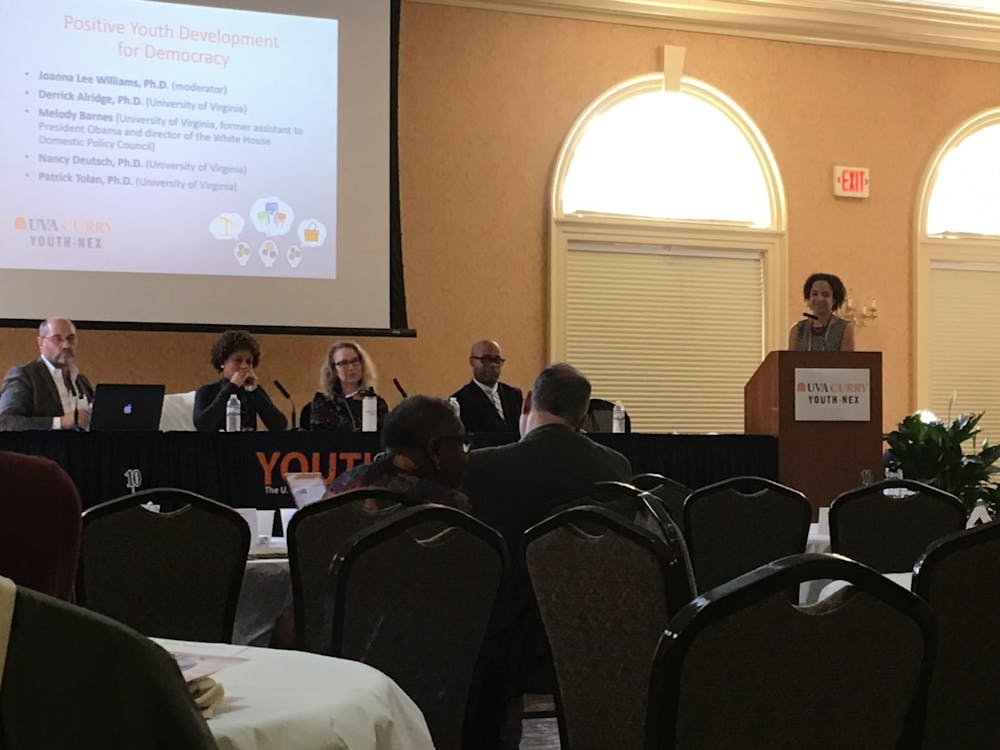On Wednesday, 75 people gathered at Alumni Hall to close out Youth-Nex’s program entitled “Dialoging for Democracy: Youth Moral Reasoning and Social Justice.” The two-day symposium invited researchers, policy makers, professors and students to discuss how to promote productive conversations about democracy and social justice.
This is Youth-Nex’s seventh annual symposium. Youth-Nex is a 10-year-old Curry school program that promotes the application of Positive Youth Development sciences to enhance youth education.
Nancy Deutsch, director of Youth-Nex and a professor in the Curry school, said that the symposium comes from the organization’s effort to “bring together people who share a commitment to supporting positive youth development, but who may not always be the same spaces or draw on the same sources of information and knowledge.”
She also noted that the program is critical for people involved in youth development because it encouraged a collaboration of ideas from different practices.
“We invited researchers, practitioners and young people who we knew were doing cutting edge work in this field and/or who have been leaders in advancing our understanding of these developmental processes and practices to speak at the conference,” Deutsch said.
According to Deutsch, this year’s theme relates to projects that Youth-Nex and the Curry School of Education are undertaking with different partners — such as the Center for Race and Public Education in the South — around the development of teacher’s resources for teaching democracy.
Deutsch described what “Dialoging for Democracy” meant and said it referred to supporting young people in their activism.
“I believe that youth development issues are social justice issues, and that part of our work as a center should be to support young people in making change that promotes equity, and this year’s conference reflects that,” Deutsch said.
Youth-Nex’s emphasis on young activists comes from a belief that while young people are the future of democracy, they also currently participate in creating social changes. According to Deutsch, the symposium highlighted how “too often schools and other youth serving spaces don’t support young people’s democratic engagement or are not equipped to have the kinds of dialogues, debates, and discussions that are required for a participatory democracy to thrive.” This failure ultimately comes from inadequate development of kids’ ability to hold productive conversations with people they disagree with and have their voices be heard.
“We wanted to discuss the foundations of moral reasoning as a developmental process from an empirical standpoint as well as highlight programs that are engaging youth in the kinds of activities that promote democratic engagement and moral reasoning, as well as amplify youth’s own voices in discussions of how this work should be done,” Deutsch said.
Some programs highlighted at the symposium included Camp Common Ground, Teen Empowerment and Side by Side Youth Leadership Council. All these groups are dedicated to instilling leadership qualities in kids and thus changing people’s perspective of them from being “at-risk” to instead having opportunities available.
On the second day of the program, a panel was held that included Deutsch along with Derrick Aldrige, a professor of Education; Melody Barnes, a professor of Public Affairs and former assistant to President Obama; and Patrick Tolan, a professor of Education. They tackled questions such as “What is democracy?” and “What is the role of dialogue in democracy?”
This dialogue centered for instance on Deutsch’s seven-year-old daughter’s frustration in school, as her daughter said that the school was trying to “tame” her. The panel then discussed how society needs to harness young people’s energy instead, discussing how student council should change to model American democracy more accurately and encouraging youth citizenship programs so kids can lead more productive conversations.
“We need kids to think about how education is liberation … We need to recognize that we participate in history and not exist outside of it,” Aldridge said.
After this talk, Josue Sarmiento, Haisell Franco and Sofhia Pineda presented their movie “Nosotros,” a film about Latinx students at Albemarle High School.
“The film’s purpose is to challenge stereotypes of immigrants and detail the struggles immigrants face in adjusting to life in the United States,” said Sarmineto.
In the closing remarks of the program, Deutsch asked the audience to write on a sticky note something they will do as a result of attending the program. Answers ranged from revitalizing programs that instill citizenship in youths to allowing children to participate in discussions about the operations of their school.
This all echoed the closing ceremony’s message provided by Johari Harris, a research associate at the University, who said, “People love youth voice but need adult action. That’s why youth talk alongside adults, so adults can go forth and create change on behalf of youths.”
CORRECTION: This article previously misspelled Johari Harris' first name and has been updated for accuracy.







